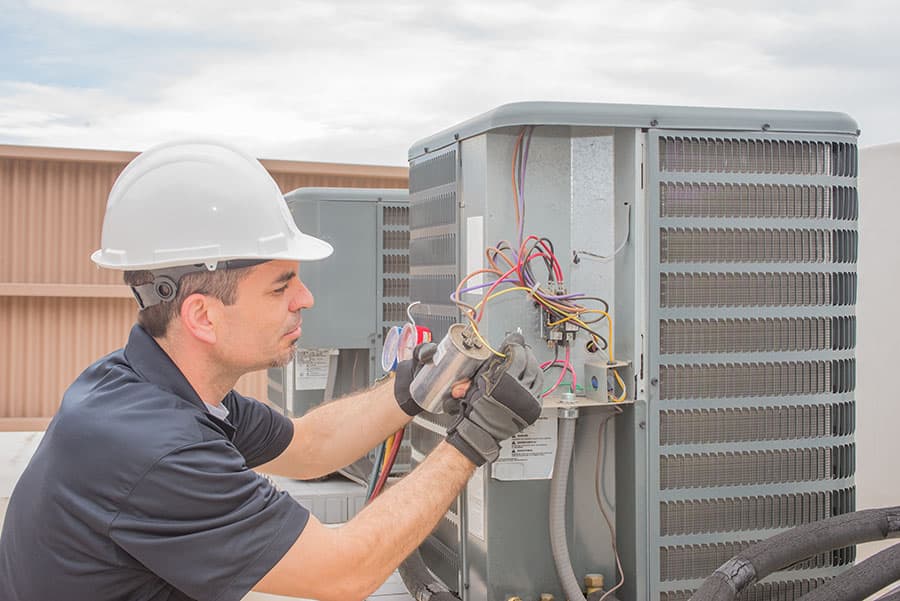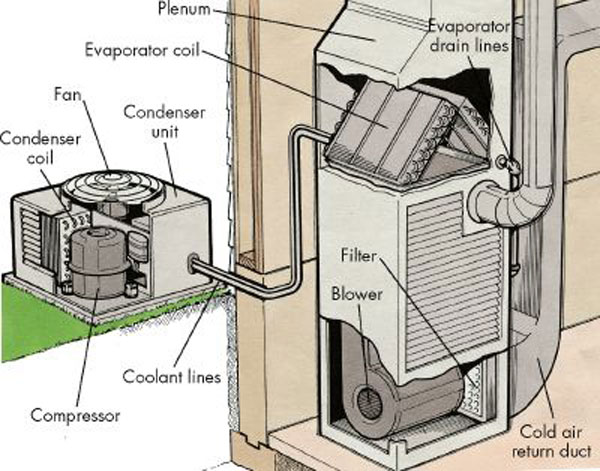See how HVAC experts improve resale value with proper care
Wiki Article
Checking Out the Necessary Elements of a Reliable HVAC System
An efficient HVAC system is improved several vital elements that work in harmony. Each part, from the thermostat to the ductwork, plays an important role in maintaining convenience and power performance. Recognizing these aspects is vital for maximizing efficiency and enhancing indoor air top quality. As one checks out these parts, the complex connections between them disclose understandings into improving overall system efficiency. What details elements add most to this effectiveness?The Duty of the Thermostat in Cooling And Heating Performance
Commonly neglected, the thermostat plays a crucial function in the efficiency of A/c systems. This little tool functions as the primary control facility, controling temperature level settings and ensuring suitable comfort within a room. By accurately picking up the ambient temperature, the thermostat interacts with the air flow, heating, and air conditioning systems to keep the preferred environment
A reliable thermostat reduces energy intake by activating the heating and cooling system just when necessary, thus stopping excessive heating or cooling. Modern clever and programmable thermostats boost this efficiency better by allowing customers to set timetables and remotely change settings, adapting to everyday regimens.
The placement of the thermostat is vital; incorrect place can lead to unreliable temperature level readings, resulting in inefficient operation. Overall, a well-functioning thermostat not only enhances convenience yet additionally adds noticeably to power cost savings and the durability of the cooling and heating system.
Understanding the Importance of Air Filters
Air filters offer an essential feature in cooling and heating systems by assuring that the air distributing within a room continues to be tidy and healthy and balanced. These filters catch dirt, allergens, and other contaminants, preventing them from being recirculated throughout the environment. By capturing these particles, air filters add to boosted indoor air high quality, which can substantially profit residents' health, specifically those with allergic reactions or respiratory problems.Furthermore, maintaining tidy air filters enhances the performance of heating and cooling systems. Clogged filters can limit airflow, triggering the system to work tougher to maintain wanted temperatures, bring about enhanced power consumption and greater energy expenses. Frequently changing or cleaning filters is an essential maintenance action that can lengthen the life expectancy of cooling and heating devices. Inevitably, comprehending the value of air filters allows house owners and building managers to take aggressive measures to ensure a well-functioning, reliable HVAC system that advertises a comfortable and secure indoor setting.

The Functionality of the Heater and Heatpump
Heaters and heatpump are critical elements of HVAC systems, accountable for giving warmth throughout cooler months. Furnaces run by home heating air through combustion or electrical resistance, after that distributing it throughout the home using ducts. They normally supply rapid home heating and can be sustained by natural gas, electricity, or oil, depending upon the system kind.Alternatively, heatpump transfer warmth as opposed to produce it. They draw out warm from the outdoors air or ground, also in reduced temperatures, and transfer it indoors. HVAC experts. This double performance permits heatpump to additionally provide cooling in warmer months, making them versatile choices for year-round climate control
Both systems need appropriate upkeep to ensure effectiveness and long life. While heaters succeed in severe cold, warm pumps can be useful in modest environments. Comprehending their distinctive capabilities aids homeowners in choosing the most appropriate choice for their home heating needs.
Checking Out the A/c System
The a/c system is an essential element of heating and cooling systems, offered in various kinds to suit different requirements. Understanding the efficiency scores of these systems is crucial for making educated choices about power usage and expense. This section will certainly check out the diverse kinds of air conditioning system and make clear exactly how effectiveness ratings influence efficiency.Sorts Of Air Conditioners
While numerous aspects influence the choice of cooling systems, comprehending the different kinds offered is essential for homeowners and structure managers alike. Central air conditioning conditioners are created to cool entire homes or structures, using a network of ducts for airflow. Window devices supply a more local solution, suitable for small areas or solitary areas. Portable ac unit give adaptability, enabling customers to relocate the unit as required. Ductless mini-split systems are another choice, incorporating the performance of main systems with the convenience of zoning, as they call for no ductwork. Finally, geothermal systems harness the planet's temperature for energy-efficient cooling. Each kind comes with unique benefits, making informed options vital for effective climate control.
Efficiency Rankings Clarified
Comprehending efficiency scores is essential for picking the right a/c device, as these metrics offer understanding into the system's efficiency and power usage. One of the my response most common ranking for air conditioners is the Seasonal Energy Efficiency Ratio (SEER), which determines the cooling outcome throughout website here a typical cooling season separated by the complete electric energy input. A higher SEER suggests far better performance. Additionally, the Energy Effectiveness Proportion (EER) is made use of for measuring effectiveness under certain problems. Another important metric is the Energy Star qualification, which signifies that an unit satisfies rigorous power efficiency guidelines. By assessing these scores, customers can make educated selections that not just maximize convenience yet additionally lower power prices and ecological influence.The Value of Ductwork and Air movement
Reliable ductwork layout and air movement monitoring play important duties in the general effectiveness and performance of HVAC systems. Proper ductwork guarantees that conditioned air is distributed evenly throughout a space, reducing temperature fluctuations and enhancing comfort. Well-designed air ducts minimize resistance to airflow, reducing the work on heating and cooling equipment and eventually decreasing power usage.Airflow management involves strategically placing vents and signs up to improve the flow of air. This prevents usual problems such as cool or hot places, which can happen when airflow is blocked or improperly balanced. Additionally, the right air duct materials and insulation can further boost performance by reducing warm loss or gain during air transportation.
An efficient ductwork system not just adds to power cost savings but can likewise prolong the life-span of cooling and heating devices by reducing unnecessary pressure (HVAC experts). As a result, recognizing the importance of ductwork and air movement is essential for achieving peak cooling and heating system efficiency
Normal Maintenance Practices to Improve Efficiency
Regular maintenance techniques are vital for ensuring peak performance of a/c systems. These practices include regular inspections, cleaning, and essential repairs to maintain the system running efficiently. Regularly altering air filters is vital, as stopped up filters can obstruct airflow and decrease efficiency. In enhancement, professionals must check and tidy evaporator and condenser coils to avoid overheating and power wastage.Annual professional assessments are additionally recommended, as skilled professionals can recognize possible issues before they escalate. Lubricating moving parts reduces deterioration, adding to a much longer life expectancy for the system. In addition, making certain that the thermostat operates appropriately help in preserving excellent temperature level control.

Often Asked Inquiries
Just how Often Should I Replace My Thermostat?
Thermostats ought to normally be changed every 5 to one decade, depending on usage and innovation innovations. Routine checks are a good idea to assure peak performance, specifically if experiencing inconsistent temperature control or raised energy costs.What Dimension Air Filter Is Best for My A/c System?
The ideal dimension air filter for an a/c system differs see this here by system style. Usually, it's crucial to seek advice from the owner's manual or check the existing filter measurements to ensure peak efficiency and air quality.Can I Install a Heatpump Myself?
Mounting a heatpump independently is possible for experienced people, however it requires expertise of electric systems and local codes. Hiring a specialist is suggested to guarantee correct setup and perfect system efficiency.Exactly how Do I Know if My Ductwork Is Efficient?
To establish ductwork effectiveness, one ought to examine for leaks, measure air movement at vents, examine insulation quality, and examine temperature distinctions between supply and return air ducts. Professional analyses can offer thorough understandings right into general efficiency.What Are Signs My HVAC Requirements Immediate Upkeep?
Indications that a HVAC system requires immediate upkeep consist of unusual sounds, inconsistent temperature levels, enhanced power bills, unpleasant smells, and frequent cycling. Resolving these problems quickly can prevent additional damages and guarantee height system efficiency.Air filters serve a crucial function in HVAC systems by ensuring that the air flowing within a space remains healthy and balanced and tidy. Furthermore, keeping tidy air filters enhances the effectiveness of Cooling and heating systems. Ductless mini-split systems are an additional alternative, incorporating the efficiency of central systems with the benefit of zoning, as they need no ductwork. Recognizing performance ratings is vital for picking the appropriate air conditioning device, as these metrics provide insight into the system's performance and energy consumption. The best size air filter for an A/c system differs by device layout.
Report this wiki page